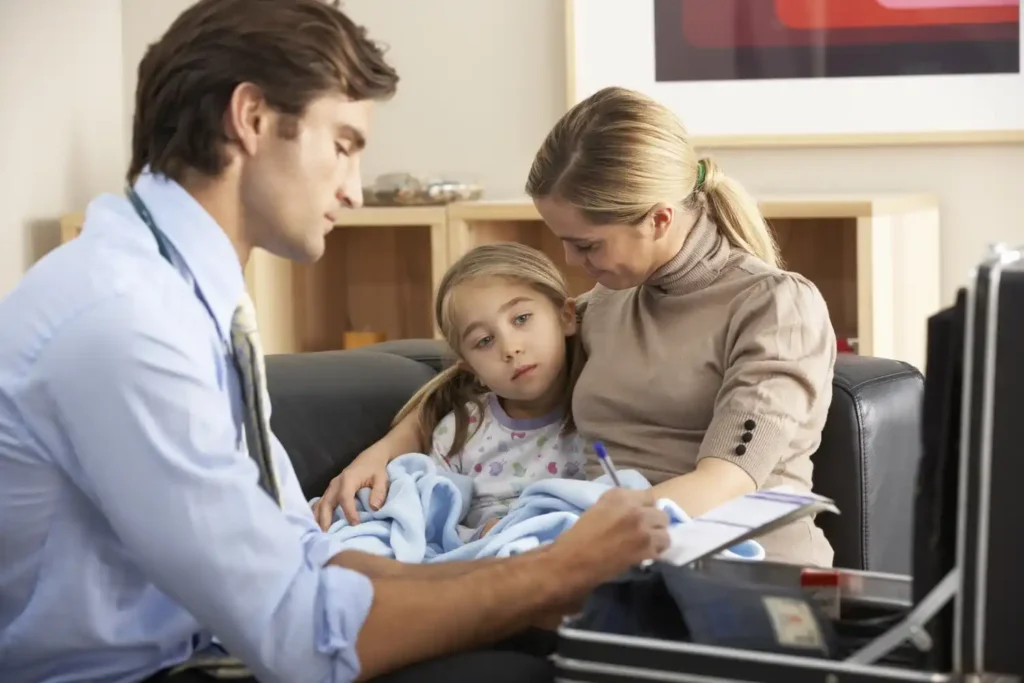
Attention Deficit Hyperactivity Disorder (ADHD) in children is a common neurodevelopmental condition characterized by symptoms of inattention, hyperactivity, and impulsivity. An ADHD diagnosis in New Jersey kids is essential for identifying the disorder early and developing effective treatment strategies. By understanding the ADHD evaluation process, families can take the first step toward managing symptoms and improving their child’s quality of life.
Understanding ADHD in children: Symptoms, Types, and Impact
Attention Deficit Hyperactivity Disorder (ADHD) is a prevalent, long-term condition that affects millions of children and can continue into adulthood. If you’re concerned about your child’s behavior, obtaining an ADHD diagnosis in New Jersey will help determine whether your child is struggling with ADHD and guide appropriate treatment. ADHD is characterized by symptoms such as difficulty maintaining focus, impulsive actions, and excessive activity, which can disrupt daily life.
The disorder is classified into three main types:
There are three main types of Attention Deficit Hyperactivity Disorder ADHD in children, each with unique characteristics:
- Predominantly Inattentive Type: This type is marked by challenges in maintaining attention, frequent forgetfulness, and easily getting distracted by surrounding stimuli.
- Predominantly Hyperactive-Impulsive Type: Children with this type often show excessive movement, frequent talking, and difficulty remaining still, which can disrupt their daily activities.
- Combined Type: This type includes a combination of symptoms from both inattentive and hyperactive-impulsive types, leading to a broader range of challenges.
Symptoms of ADHD in children
Recognizing the signs of ADHD in children in New Jersey is essential. If you observe any of the following behaviors in your child, it may be time to schedule an ADHD diagnosis in New Jersey to ensure proper care and support:
- Difficulty following instructions or completing tasks
- Trouble organizing activities
- Fidgeting or inability to stay seated
- Interrupting others or talking excessively
- Forgetfulness in daily activities
Impact of ADHD in children
ADHD in children can significantly impact various aspects of a child’s life. An ADHD diagnosis in New Jersey provides parents and educators with a clear understanding of how the disorder affects a child’s behavior, learning, and development. Key areas impacted by ADHD include:
- Academic Performance: Children with ADHD may struggle with focusing on schoolwork, completing assignments, and following instructions, which can lead to lower grades.
- Social Interactions: Impulsivity and difficulty paying attention can make it hard for children to form and maintain friendships. They may interrupt conversations or have trouble reading social cues.
- Emotional Well-being: Many children with ADHD experience frustration, low self-esteem, or anxiety due to their challenges. They may feel different from their peers, which can impact their overall happiness.
- Family Dynamics: ADHD can affect family relationships, as parents and siblings may struggle to understand the behaviors associated with the condition. This can lead to stress and conflict at home.
Diagnosis and Evaluation of ADHD in children
Diagnosing ADHD in children requires a comprehensive evaluation to ensure an accurate diagnosis and effective treatment plan. Seeking an ADHD diagnosis in New Jersey is essential for understanding whether your child has ADHD and identifying the most appropriate treatment approach. The evaluation process includes:

- Clinical Interview: A healthcare professional conducts an interview with the child and their parents to gather detailed information about behavior, symptoms, and family history.
- Behavioral Assessments: Various questionnaires and checklists may be used to evaluate the child’s behavior in different settings, such as home and school.
- Observation: The clinician may observe the child’s behavior in a structured environment to assess attention, impulsivity, and activity levels.
- Review of Records: Academic performance and medical records are reviewed to identify any patterns or concerns related to the child’s behavior.
- Collaboration with Educators: Input from teachers and school staff can provide valuable insights into the child’s behavior in an educational setting.
ADHD diagnosis and Management in children requires a comprehensive and compassionate approach. Partnering with the best pediatrician in New Jersey ensures your child receives a thorough evaluation, accurate diagnosis, and tailored treatment plan to address their unique needs. At Fayrouz Pediatric Clinic, our experienced pediatricians are dedicated to supporting children with ADHD and helping families navigate this condition effectively.
Tools Used for ADHD diagnosis in children and Evaluation
Evaluating Attention Deficit Hyperactivity Disorder ADHD in children involves several tools and methods to ensure a comprehensive assessment. Here are some commonly used tools:
- Rating Scales: Standardized questionnaires that parents, teachers, and sometimes the child complete to assess behaviors and symptoms associated with ADHD.
- Behavioral Checklists: List specific behaviors that help clinicians identify areas of concern, such as inattention, hyperactivity, and impulsivity.
- Diagnostic Interviews: Structured conversations with the child and family that explore symptoms, their duration, and their impact on daily life.
- Observation Tools: Instruments used by clinicians to systematically observe the child’s behavior in various settings, noting attention levels and impulsive actions.
- Cognitive and Academic Assessments: Tests that measure cognitive skills, attention spans, and academic performance to identify any learning difficulties that may accompany ADHD.
Management and Treatment Options for ADHD in children
 Managing Attention Deficit Hyperactivity Disorder (ADHD) involves a combination of strategies and treatments tailored to meet the individual needs of the child. Here are some effective options:
Managing Attention Deficit Hyperactivity Disorder (ADHD) involves a combination of strategies and treatments tailored to meet the individual needs of the child. Here are some effective options:
-
-
- Establishing Routines: Creating structured daily schedules can help children with ADHD know what to expect and stay organized.
- Setting Clear Expectations: Clearly outlining rules and responsibilities allows children to understand what is expected of them, reducing confusion.
- Positive Reinforcement: Encouraging good behavior with praise or rewards can motivate children to follow rules and complete tasks.
-
Behavioral Therapies
-
-
- Cognitive Behavioral Therapy (CBT): This type of therapy helps children learn how to manage their thoughts and feelings, improving their behavior and coping strategies.
- Parent Training Programs: These programs provide parents with tools and techniques to support their child’s behavior and develop effective strategies for managing challenges.
- Social Skills Training: This therapy helps children improve their interactions with peers, teaching them how to communicate and relate better to others.
-
If you’re looking for professional guidance on understanding your child’s behavior, scheduling an ADHD Testing & Evaluation near you in NJ can provide clarity and direction. At Fayrouz Pediatric Clinic, we specialize in comprehensive assessments to identify ADHD symptoms and create tailored treatment plans, helping children thrive both at home and school.
Available Medications
-
-
- Stimulant Medications: These are the most commonly prescribed medications for ADHD. They help improve focus and reduce impulsivity by enhancing brain activity in areas that control attention.
- Non-Stimulant Medications: These may be prescribed for children who do not respond well to stimulants or experience side effects. They also help manage ADHD symptoms but work differently than stimulants.
-
Supporting Children with ADHD
Supporting children with Attention Deficit Hyperactivity Disorder (ADHD) is essential for helping them thrive both at home and in school. If you suspect your child may have ADHD, seeking an ADHD diagnosis in New Jersey is the first step. Here are effective ways to provide support:
How to Support Children with ADHD
- Provide Structure: Creating a predictable daily routine helps children know what to expect, making it easier for them to manage their time and tasks.
- Facilitate Expression: Create an environment where children feel safe to share their thoughts and emotions. Acknowledging their feelings can foster a sense of understanding and validation.
- Use Visual Aids: Charts, calendars, and checklists can help children remember tasks and responsibilities, aiding their organization and focus.
The Role of Family and School
-
-
- Family Support: Family members play a crucial role in helping children with ADHD. Providing patience, understanding, and consistent encouragement can significantly impact their self-esteem and behavior.
- Collaboration with Educators: Teachers and school staff can help by implementing individualized education plans (IEPs) or 504 plans that accommodate the child’s unique needs.
- Creating a Supportive Environment: Both at home and school, a calm and structured environment can reduce distractions and help children focus better on their activities.
-
Understanding and supporting children with Attention Deficit Hyperactivity Disorder (ADHD) is vital for their development and overall well-being. If you are in New Jersey and suspect your child may have ADHD, an ADHD diagnosis in New Jersey can provide you with the clarity you need. Increased awareness about ADHD allows families and educators to recognize the signs and provide the necessary support to help these children thrive. By implementing effective management strategies, utilizing available treatments, and fostering an encouraging environment, we can make a positive difference in their lives.
If you have concerns about your child’s behavior or suspect they may have ADHD, don’t hesitate to seek professional guidance. At Fayrouz Pediatric Clinic, we offer ADHD diagnosis in New Jersey, including Clifton and Paterson, through comprehensive evaluations and personalized treatment plans tailored to meet each child’s unique needs. Our team is dedicated to supporting your child every step of the way.
Contact us today to schedule an appointment and take the first step toward accessing our services, and helping your child succeed and thrive!